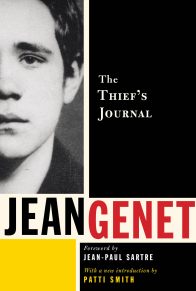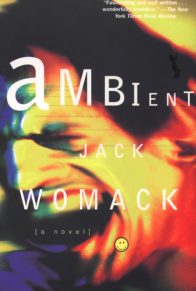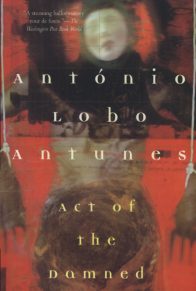Young Ogi’s new acquaintances had recently dubbed him the Innocent Youth, an appellation he didn’t really mind, seeing that these people, except for the young girl, were nearly his father’s age. The girl, he knew at a glance, was far less innocent than himself. Ogi recalled reading about the two elderly men–Patron and Guide, as they were called–in the newspaper some ten years before; they were central characters in a scandalous religious incident they called a Somersault. From Ogi’s perspective, then, they were not only participants in an episode from the past but also men still in the prime of life–though reports of the incident a decade before had portrayed them as getting on in years.
The two men’s unusual names came about in the following way. At the time of the incident, when the two severed their ties with the religious organization they led, The New York Times had substituted these playful names, and the two men decided to adopt them.
Later on, they created a similarly playful name for the young girl who assisted them in their life together, christening her Dancer.
When Ogi first found out that the two men had maintained a strict silence in the years following the incident, he was deeply impressed. Other than the minimum connections needed to survive, they’d lived in total isolation from the outside world. Ogi was further amazed at Patron’s enormous energy, despite the fact that he was the older of the two and wasn’t so physically robust. Patron spent his days tucked away from society yet in high spirits, as if surrounded by matters of the utmost urgency. But Ogi had also caught a glimpse of the deep depression to which he was prone.
For his part, Guide was always calm and self-possessed and was clearly, even to an outsider, Patron’s valued companion. When the two of them conversed they reminded Ogi, straining to come up with an appropriate metaphor from his limited reading, of Kanzan and Jittoku, the legendary Tang dynasty monks. Peeking in on their amiable chats, Ogi inevitably found Dancer already with them, and after dealing with the two men became part of his regular job, he saw something unnatural, even irritating, in the way the girl related to these two elderly men. All these emotions vanished, however, when Dancer revealed to Ogi her mother’s dream that her daughter study education at the university in Asahikawa where her father taught science and become a middle school or high school teacher in Hokkaido. If I’d listened to her, Dancer told him, my life would have been very different. I never would have experienced the fulfilling days I’ve spent with these two men, who are, in every sense of the words, my true Patron–in the sense of teacher–and Guide. Ogi had to agree with her assessment. There was indeed something special in the relationship between this young woman and the two older men.
Employing another youthful metaphor gleaned from his scanty reading experience, Ogi saw these two men in their fifties as a pair of grizzled sailors pulling into port after a grand ocean voyage. The image was prosaic, yet it had a sense of reality, despite the fact that placid, chubby little Patron and tall, muscular, hawk-profiled Guide wouldn’t strike anyone as fellow sailors on a ship. Once this metaphor came to mind, though, Ogi tried it out on Dancer. Her reply left him flustered.
“Patron and Guide haven’t yet made landfall but are still in the midst of a gigantic storm,” Dancer replied. “In the not-too-distant future, as the waves and wind build up higher, even you will begin to see the gale and the downpour. Until then, I suggest you find a safe harbor where you can take shelter.”
“What about you?” Ogi asked.
“I’ll hitch my star to the captain and the chief navigator,” the girl said, nearly whispering, her mouth slightly open, her moist pink tongue visible.
Despite what this physical description might imply, there was a simple reason why Ogi did not at first feel entirely comfortable with Dancer. Granted she had a unique personality and was young and pretty enough to attract most young men. Viewed from a different angle, her habit of antagonizing him might very well be part of her charm.
Her voice and the way she spoke, as if she were whispering secrets, were alluring, her slim, lithe body right up next to you, as if she wanted to hold you close and start dancing. That intimate voice, though, was rarely restrained from adding some sharp, critical comment.
For innocent young Ogi, the combination of Dancer’s whispery way of speaking and the way her mouth always seemed half open–which oddly enough didn’t make her come across as dull; indeed, it appeared to him merely as a punctuation mark in an otherwise intelligent and alert expression–wasn’t something he could view dispassionately.
2
As part of his present job, Ogi got in touch with Dancer, Patron and Guide’s private secretary, once every other month. Since he’d taken the job, not once had it been the other way around–Dancer phoning him. But now here she was, suddenly contacting him with the message that Patron urgently wanted to see him. The phone message was relayed to him by fax from the Tokyo head office of the International Cultural Exchange Foundation, for which Ogi worked–the post that kept him in touch with Patron as part of his job. The fax arrived in Sapporo, where Ogi was escorting a French physician and his wife to a conference of the Japan Dermatological Association:
Someone named Dancer called–she’s Japanese, I’m pretty sure–saying she had to get in touch with you immediately. She said Guide has collapsed from a hemorrhage and Patron has to see you right away. I assume these are nicknames? I asked for their real names, but she said you’d understand. Since it would cause more trouble than it’s worth for the conference to give her your hotel and phone number, I requested that she get in touch with you through us here. The woman seemed almost possessed. Dancer, Guide, Patron–what kind of people have you got yourself mixed up with?
Ogi’s main assignment at the time was to escort the doctor and his wife, both from Lyons, to an office at the hotel that had been booked for the conference; the doctor was to deliver the keynote address. After making a long-distance call to Patron’s residence, Ogi escorted the French couple to the mammoth preconference dinner reception, where the head of the Association, a longtime research collaborator of the French doctor’s, sat waiting at the table with his wife to greet them. This accomplished, Ogi explained his situation to the conference staff, rushed by taxi to the Chitose airport outside Sapporo, and boarded the Tokyo-bound plane. Ogi realized he’d never before acted so rashly. It made him feel uncomfortable, yet this emotion alternated with a definite delight at having taken such a bold step.
The next morning, the foundation–or rather Ogi, as its representative–was to take the French doctor’s wife around Sapporo by car while her husband was giving his speech. On the way back from the Chitose airport, Ogi might very well get stuck in traffic and not make it back in time, but still he decided to fly to Tokyo without arranging for someone to fill in for him. Ogi was normally a person with a strong sense of responsibility, and though this word can easily take on a negative connotation, he was even something of a perfectionist. Despite all this, he found skipping the next day’s work profoundly gratifying.
This feeling of satisfaction was certainly in keeping with his youthful innocence, but such behavior couldn’t be measured by the yardstick he’d lived his life by up to this point. A premonition even struck him that this hasty act might end up destroying the self-image he’d so carefully crafted. Why Ogi made such an out-of-character decision at such a critical time, though, was quite simple. It was that gentle whispery voice, that half-open mouth like an eel moving through water. Even over the phone, when he called, Dancer’s breathless and intimate way of speaking had grabbed him. Without letting him get a word in edgewise, she explained the situation.
“Guide was invited to a gathering of former members of the church, and he collapsed there, apparently from a brain aneurysm. Before Guide spoke, while they were still eating, he complained of a headache. After this he felt bad and vomited in the bathroom. Fortunately there was a doctor at the meeting, and he arranged for Guide to be taken right away to a university hospital where a friend of his works. They operated on him for eight hours, and at this point things look promising. But he lost a lot of blood. Patron’s been saying that ever since Guide took on the responsibilities of helping lead the church he’s suffered from chronic collagen disease. Patron was worried that he’s been battling illness for so long his blood vessels may have become weakened. He started crying after he said this. I can’t handle all this alone. I need you to come back!”
Ogi told her he was scheduled the next morning to take the French doctor’s wife, herself a tree specialist with some books to her name, to see the Tokyo University experimental tree farm, but Dancer brushed that aside.
‘don’t wait till tomorrow. Take a plane to Haneda airport tonight and come straight to our headquarters. There’s no one else nearby who can help. Patron’s miserable, like a stonefish shot by a spear gun.”
Ogi pictured Dancer’s slim, muscular shoulders and upper arms, and the imagery she employed made him wonder for a moment if she maintained her physique through a little scuba diving thrown in on top of her dancing. He was convinced, though, of the urgency of the situation.
Arriving at Patron and Guide’s office in Setagaya, Ogi walked through thick trees that gave way to a hedgerow toward the single-story building, all the while gazing up at the night sky. The stars were bright, the sky as clear as it had been in Hokkaido.
Before he could ring the front doorbell, Dancer opened the door from inside and stood there on the brick walkway, as if staring right through him.
“You should always ring the bell at the gate. Sometimes we have the Saint Bernard loose in the garden.” Her always-sweet whisper contained a warning.
Dancer led the way into spacious connected living and dining rooms and, leaving Ogi in the faint glow of a lamp on a low bookshelf between a sofa and an armchair, strode off down the dark corridor leading to Patron’s study-cum-bedroom.
Ogi sat down on the edge of the sofa nearest the entrance and recalled the time he’d delivered smoked turkeys from the foundation at the end of last year. He had had a lot of stops to make, and the chairman had instructed him to finish by Christmas Eve, so it was late at night by the time he reached Patron and Guide’s home. At an intersection two streets away from the house he ran across Patron out walking his dog. Sleet was falling, the streetlights barely illuminating the road, and the short stocky man walking slowly down the street in a rain poncho reminded Ogi of the wooden toy soldier his father had brought back for him as a present from Germany when he was a child. The man was accompanied by a Saint Bernard whose body was as long as the man’s torso. At first Ogi found his gaze drawn solely to the man’s quiet footsteps, the way his body stayed completely level as he walked. The dog walked in exactly the same way. The hood on the man’s poncho covered his face, and the dog’s body was covered in the same material, which lent them a further air of similarity. After he passed them, it took a moment for Ogi to realize that the man was Patron, but he hesitated to turn and call out to him. The majestic and solemn way that Patron and his dog walked, like two brothers, kept him from saying anything.
Ogi recalled all this as he waited in the dimly lit room; he stood up and gazed out through a break in the curtain on the broad glass door at the darkened garden and its dense growth of trees. From behind a stealthy voice, Dancer’s, addressed him.
“Are you checking out the doghouse? Why do that? He’s inside it. You needn’t worry that he’ll attack you.”
Used by now to her chiding, Ogi said nothing and merely looked down at the brick walkway below his feet. On both sides of the room, running the entire length, was a complicated sort of European shutter system, not now being used. Guide had explained why they were there to Ogi not long ago, as he stood on this very spot.
When Patron and Guide first moved into this house they had a terrible persecution complex and believed many people hated them. Fearful that these people would throw rocks at them, they decided to install sturdy shutters for protection. They were afraid that rocks thrown from outside would shatter the windows, so the sensible thing would have been to put the shutters on the outside of the fixed glass, but Patron had insisted on having them as close to him as possible as he lay reading on the sofa, so they put up these interior ones with their complex system of rails and wooden doors. Eventually the world lost interest in the two men, and once that happened Patron finally was willing to have this strange contraption removed someday. For whatever reason, Guide explained all these details to Ogi. On that day, Patron happened to be in the throes of one of his bouts with depression and did not come out of his room, so it was Guide who dealt with Ogi, visiting as usual on foundation-related business.
“Patron’s awake now, and you can see him by his bedside. But no silly questions, okay?” Dancer continued, in an overbearing manner that made Ogi instinctively recall her entreaties to him over the phone.
Dancer spun around, pivoting from the waist. In the instant as she turned away, and just before following her down the corridor, Ogi was sure he caught a glimpse of a thread of saliva deep in her mouth, glinting silver in the light of the low lamp. But the youth could only grasp in a conceptual way what might be sensual to another.
Patron was lying on his low bed facing them, in a room even darker than the hallway. Dancer led Ogi to a bedside table with a lamp on it; when he saw Patron’s face in the lamplight, Ogi was pierced to the quick. Patron, so much older than he was, lay there looking up at Ogi with tearful imploring eyes, the kind of gaze you just couldn’t hold. Ogi stared off into space and listened to his sad complaints.
“I don’t have all that much goodness in the past to remember,” Patron said, “and now I feel like I’ve lost the future as well. Even if I were to fall into a trance again and go over to the other side, anything I might say about my experiences there would just be so much nonsense. Guide is the only one who can make my words intelligible, so for the first time people on this side can understand me. Without Guide to listen to me, my words are like a feverish delirium, and afterward I have no memory of them at all. All that remains is the empty husk where the fruit of meaning once resided.
“Without Guide, my words are nonsense. Looking back now on our life together, I see with great clarity how true that is. Even if I were to write my memoirs, without him I couldn’t say a thing. The same holds true for the Somersault. Guide put everything in order and created memories for me. But now that he’s collapsed, what can possibly remain? I’m no better than a corpse.
“Nothing of substance will remain from my life, not even words. This is especially true when it comes to my concept of the future. Only through Guide can the visions I have be put into recognizable words and these concepts made possible. Without him I’m left with no past and no future. If all I have is the present, that’s the same as saying that all I have left is this present hell! Why in the world did this happen to me?”
With this pitiful question–Ogi knew he wasn’t really expecting an answer–Patron fell silent. Despite the impassioned words, his long, enervated, deeply still face maintained a passive look, demanding nothing of his listeners. The only relevant thought that passed through Ogi’s mind was that he’d never in his life before encountered such a deeply peaceful yet despairing adult. An aged child with the despairing soul of a youth.
Ogi said nothing. Beside him, also silent, Dancer nodded a couple of times, like a mother soothing her child. I hear you, things will be fine, her nods conveyed, not seeking any solutions to the problem. How could she be so calm when she’d pleaded with him to rush back to Tokyo?
While Ogi stood there, unresponsive, Dancer got up and bustled briskly about the room. From the darkness beyond the circle of light cast by the lamp, somewhere over near the wall, she fetched a chair, one lower than a normal chair and the same height as the bed; next to that she placed a cushion for her own use. Ogi sat down in the chair, legs straight out in front of him; he smelled a powdery leather odor as Dancer plopped her rump down on the cushion. This way the two of them were on the same level as Patron, who was leaning in their direction.
Ogi glanced over at Dancer, her half-open mouth glistening faintly in the light, then turned his gaze to Patron, waiting expectantly for his tearful voice to resume its tale of woe. There had to be a special reason why Dancer chose him to be her partner here, he thought, trying to compose himself.
In the west corner of the bedroom/study, just outside the curtain and the glass door, there was the movement of some large beast. That had to be where the doghouse was. The Saint Bernard’s restless stirrings overlapped in Ogi’s mind with Patron’s black spacy eyes, and once again the image came to him of that sleety night, man and dog in identical rainwear, out for a walk.
©1999 by Kenzabo Oe. Translation
©2003 by Philip Gabriel. Reprinted with permission from Grove Atlantic, Inc. All rights reserved.













